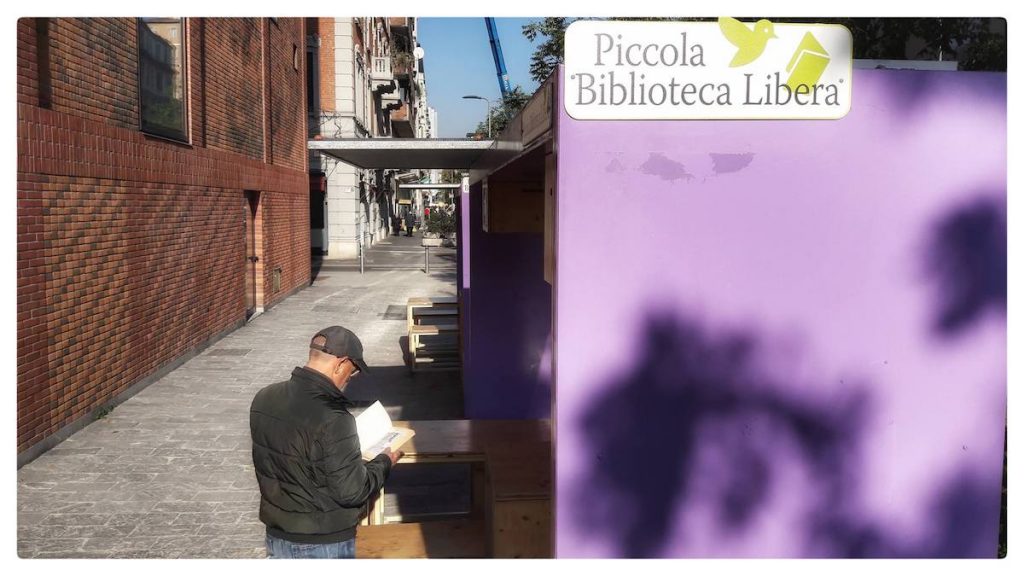The sociologist Marco Salomon, a life spent in advertising, has a great devotion for the environment and fights to improve what exists to preserve the planet in harmony between all generations.
Member of environmental, landscape and cultural heritage associations, for almost twenty years he chairs and created with other volunteers, a small bottom up cultural miracle – Piccola Biblioteca Libera, the Little Free Library – which helps us to widespread the love for reading to all latitudes, after having collected and told the story of Libreria dell’Assunzione (Naples), that of Shubigi Rao from Singapore and many others that you can find browsing our pages. Today it’s Milan’s turn, especially one of my favorite neighborhoods where I have lived for a long time and which has now completely changed its skyline, Isola.
Your life in a few lines, right where it begins. And that of the Piccola Biblioteca Libera (Little Free Library)
I was born in Tradate, Varese, in the 1960s when the town was known for Lesa, the industry producing record players popular in Italy, those machines that played 45s that today can be found at vintage fairs. Once I finished high school I fled to Milan, exactly to the Isola district. I am sociologist by training, with a professional life spent as a marketing and communications consultant. Today I dedicate myself a lot to an ancient passion: environmentalism and in particular the protection of trees, our precious allies in this too polluted city.
Piccola Biblioteca Libera was born from a piece of news: over 200,000 books a year end up in the waste paper bins in Milan. Why do not create a system that saves books from destruction and puts them back into circulation? So in 2016, with a small group of volunteers, we created the first branch of Piccola Biblioteca Libera in Milan in Via Federico Confalonieri, restoring some existing structures and transforming them into an open-air library. Then in 2020 we grew by opening three more book points, to cover the entire Isola district: in addition to via Confalonieri we are also in via Borsieri, in piazzale Segrino and in largo de Benedetti, right in front of Palazzo Lombardia (the regional government offices, note of the editor).
Who are the usual public and readers who frequent you regularly?
PiBiLi, as its many visitors call it, has a very large audience: over 50,000 books enter and leave every year. We go from the inhabitants of the neighborhood to book crossing enthusiasts in Milan and beyond. We receive donations from all over Italy. In general we are a concrete model of circular economy and a public service. A home for books that no longer have a home and an opportunity to read for those who often have a passion for reading and not the economic means to cultivate it.
You are in a neighborhood with great ambitions definitely innervated by a new population of passers-by and new residents who join the previous ones who have not gone away. Also innervated by this unusual public space which has changed the characteristics of social interaction and comes from long aftermaths of works that lasted a very long time.
However, the history of Isola comes from afar, one of a kind as the many foreigners who live here would say, and ultimately it is no longer as hospitable as it once was (you too have been damaged)….
Our main office in via Confalonieri is located in a very symbolic place full of history. Here was the headquarters of Brown Boveri, which at the end of the 19th century was one of the first industries built in reinforced concrete, with a zigzag glass roof. Demolished in the early 80s of the last century, it was replaced by new buildings such as the Vertical Forest and, next to us, as the House of Memory with its facades covered in mosaics representing moments in the city’s recent history. The garden that surrounds us is very popular and is one of the greenest and coolest in the summer heat. Really recommendable.
The transformation of Isola district has been very marked: from an almost peripheral working-class neighborhood to high-cost residences. We still have public housing buildings in front of us, and their inhabitants are among our volunteers and visitors. Today Isola is transforming itself into a nightlife district; this transformation is changing the neighborhood, not always in a positive way. In this scenario we are a bit of a garrison for those who live in a neighborhood – and an appreciated curiosity for the many tourists, often young, who visit Isola.
A time of day that you love and the people going through it
Like others do, I happen to use the tables of the Piccola Biblioteca Libera to stop and read or work. A pleasant place where you can always find books that are often unobtainable. The light at sunset is very beautiful.
A book and a song with you right now
Days ago I found among our books a 1955 edition of Edgar Lee Masters’ Spoon River Anthology itranslated by Fernanda Pivano. The desire to listen to the album that Fabrizio de Andrè made from it is obvious. My favourite? The Story of Player Jones.
A secret place you love in Milan to read away from your books if that happens
It’s not a secret but is definitely a little hidden. The Brera Botanical Garden, where you will find the oldest trees in the city.

2 Responses to “Marco, Piccola Biblioteca Libera Milan”
Antoaneta
I was recently in Milan for work and squeezed in some time to explore the city after 20 years. Definitely catering more to tourists’ tastes (Navigli area changed dramatically), but discovering Isola, the nearby park and #PiBiLi was a very nice surprise. Grazie, Marco Salomon, è un bellissimo progetto!
admin
Thank you very much Antoaneta, we forward your comment to Mr Salomon!